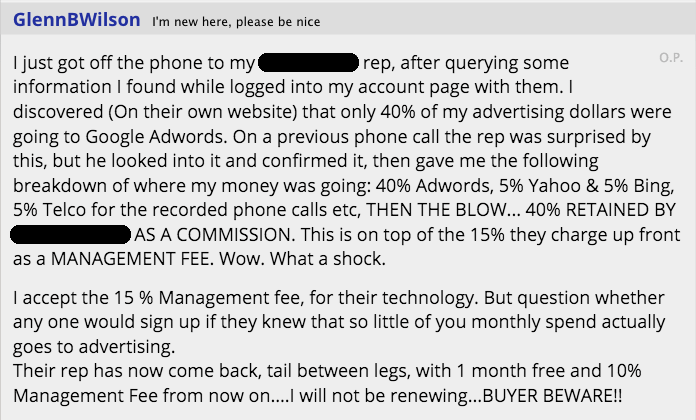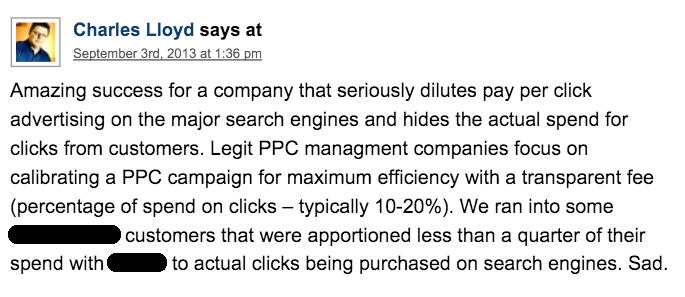Learn The Truth About Fees And How To Avoid Deceptive Price Tactics
Pay-Per-Click (PPC) Advertising is a scalable source of traffic and leads.
You can start with a small budget and target prospects at the moment they are looking for your products and services…
But here’s the problem…
A lot of the so-called experts offering pay-per-click services will take your money and deliver very little return on investment.
They use deceptive pricing to charge high fees with very little regard for your campaign results.
And this isn’t just something I made up…
Here’s a message from Google warning advertisers who are looking to hire a third-party agency.
What to watch out for
We believe that it’s important for you to have a great experience with Google advertising. If you don’t, please let us know. Make sure that you first work with your third-party partner to try to resolve any issues before contacting us.
Many third parties have earned our trust by representing the best interests of their advertisers. But some third parties do not. Here are some activities to watch out for and let us know about:
- Not sharing the cost and performance of advertising campaigns: You have a right to know, at a minimum, the number of clicks, impressions and cost of your Google ads.
- Guaranteeing ad placement, either on a specific advertising channel or in a specific position: It’s not possible to guarantee a specific ad position on Google.com search results pages. Ad position is determined by an auction and changes dynamically with every new search. Some third parties may only charge you if they achieve your desired ad placement, but those that guarantee a specific position (i.e. the top position every time a user searches for your keyword) are misrepresenting how Google’s advertising works.
- Claiming to be from Google: Ask this person for their name and to email you from their @google.com (not @gmail.com) email address; if you’re still unsure, contact us to find out.
- Harassing or bullying you into signing up: Third parties cannot remove your business from the natural or organic search results on Google.com.
- Claiming advertising on Google will affect your organic or natural ranking: Advertising on Google has no impact on your organic or natural ranking in the search results; the two are completely separate.
- Deceptive pricing: The agency may not use the correct advertising budget as agreed with you. Make sure that you get an official copy of your agreement in writing.
* https://www.google.com/adwords/thirdpartypartners/
While Google try to regulate their partners, even the largest agencies find ways to remain compliant while still keeping their true costs hidden.
Whistleblower comments regarding one of Google’s largest PPC partners:

* http://forums.whirlpool.net.au/archive/1835711

* http://screenwerk.com/2013/09/03/whats-wrong-at-reachlocal
** Theses comments were made on third party websites. Click Profits cannot verify the accuracy of these statements.
FACT: As much as 60% of your advertising spend is gobbled up in agency fees
What this means is… the typical small business spending £12,000 per year (£1,000 per month) will pay as much as £7,200 in agency fees. Only £4,800 gets spent on buying clicks.
Or to put it another way, if the original Google cost-per-click is £1… then including agency fees you’ll end up paying an average of £2.50 per-click.
In this report, I’m going to show you how to avoid hidden fees, and find a quality pay-per-click service.
What this means is… the typical small business spending £12,000 per year (£1,000 per month) will pay as much as £7,200 in agency fees. Only £4,800 gets spent on buying clicks.
Or to put it another way, if the original Google cost-per-click is £1… then including agency fees you’ll end up paying an average of £2.50 per-click.
In this article I’m going to break down fees in pay-per-click advertising. So you can avoid hidden fees and get a quality pay-per-click service.
Hi, I’m Jake Meah and I’m the CEO and Founder of ClickProfits.co.uk.
Over the past several years I’ve consulted with hundreds of businesses, and invested well over $3 million dollars of client money.
If there’s one form of advertising I know better than any other it’s pay-per-click.
So here’s why I created this Price Guide…
The online industry is swarming with agencies that use deceptive price tactics. They charge hidden fees while clients believe they’re getting a budget service.
When their advertising fails, they think that Pay-Per-Click advertising doesn’t work for their business.
When the truth is, it can work, just as long as they get a fair price and quality service.
Deceptive pricing is a big problem for us…
You see, for our standard service we charge a 20% management fee. Which is very competitive.
However, when compared to these hidden fee agencies, who only disclose a small portion of their fee, we appear to be the more expensive option. When in fact the opposite is true.
So you see, deceptive pricing is damaging the industry and making it hard for us to operate a fair and transparent service.
And recently, after coming up against this for a final time, I decided to tackle this problem with a more direct approach… and created this Price Guide…
So with that said, let’s get started…
Pay-Per-Click Cost Fundamentals
Before I explain how agencies use deceptive pricing, you need a basic understanding of the components of price.
These include:
- Total Spend
- Click Budget
- Cost-Per-Click
- Quality Score
- Management Fees
Let’s take a look at each of these in detail:
Total Spend
This is the total amount (excluding tax) that you allocate towards your PPC campaign. It typically comprises the click budget and all associated management fees.
How much you spend is up to you. However, some agencies have a minimum spend requirement for businesses that want to engage their services.
Click Budget
This is the portion of your spend that goes towards buying clicks from Google (and other publishers).
Click budget directly impacts traffic volume. If you currently get 200 clicks to your website, then doubling your click budget can give you a similar increase.
However, click budget isn’t the only way to increase traffic.
More on that in just a minute…
Cost-Per-Click
Cost-Per-Click (CPC) is the actual price you pay to generate a click to your website.
Your ad shows up in Google search and Google’s Display Network. And a per-click fee is deducted when a prospect clicks through to your website.
PPC advertising is a click auction. Every time a search phrase triggers your ad, Google instantly calculates your ad position and cost-per-click.
Yet unlike most auctions where highest bid price wins, pay-per-click advertising also uses a “Quality Score” component.
Quality Score
Google defines “Quality Score” as:
“An estimate of the quality of your ads, keywords and landing page. Higher quality ads can lead to lower prices and better ad positions.”
– Google.com
This is crucial and worth repeating…
With the right Quality Score strategy you can get higher ad positions and discounted clicks.
Management Fees
This is the portion of Total Spend that pays for the implementation, strategy, and management of your campaign.
How much you pay, and what you get for your money will differ from one agency to another.
Some management fees include sophisticated tracking and reporting software. Others charge a premium for higher levels of service.
Before giving an agency your money, make sure you ask questions and do your research to understand what you get for your investment.
The 3 Most Common Price SCAM’s
Now that you have a basic understanding of cost, I’ll explain how agencies manipulate price with deceptive price tactics.
Hidden Fees
Despite what some sales reps might tell you, management fees are the only way Pay-Per-Click agencies make money from your advertising.
Google does not fund or give kickbacks to agencies. The fee must come from your campaign.
Hidden fees are the most common form of deceptive price tactic. And since Google’s exact cost-per-click algorithm is not made public… agencies can easily hide their fees without detection.
Here’s how they do it:
The agency will charge a faux management fee of around 10-20% of total spend. The main purpose of this is to (1) appear price competitive, and (2) draw your attention away from how they make their money.
Then, a further 50% of the click budget is taken in hidden fees. This is then reported to you in a combined sum and labelled as cost-per-click.
Fixed Price for Unlimited Clicks
Have you heard the saying… “If it sounds too good to be true, then it probably is”?
Well this is one of those situations.
Agencies will offer unlimited clicks on the specified keywords for the entire month (or however long the agreed campaign period).
And to most novice advertisers, it will actually appear as though they deliver on their promise!
Your ad will be visible on the specified keyword, and for the entire month!
Now, remember what I said previously…
“all agencies must charge fees in order to make money from your campaign.”
So here’s how this is done:
Pay-per-click advertising allows for various targeting filters. I’ll explain just one of these filter in the context of this scam (there are several that can be used with the same effect).
Let’s say you are offered unlimited clicks on the keyword “Plumber”.
Using a standard keyword tools, we can predict, with a reasonable level of accuracy, how many searches the keyword “plumber” will get per month.
Then from this we can also predict how many clicks, and, how much that keyword is going to cost in ad spend.
Then, by narrowing the campaign “target location” filter, we can reduce the ads target area down to a very small radius.
So let’s say the new target location is set to 1 mile around your business location.
By restricting the location settings, it dramatically decreases the reach, potential clicks, and spend generated through the campaign.
While employees of the business continue to see the ad throughout the day and whenever they search from within the target location.
Thereby giving the illusion of “unlimited clicks”. When in fact, their investment will generate very low traffic to their website.
Guaranteed Ad Position
This offer is a variation of the unlimited clicks example above. It uses the same tactic of narrowing the targeting filters to restrict the campaign reach and limit total clicks and spend.
Then, they give the ad a high bid price in order to force the ad into a premium ad placement.
Remember, despite having a high bid price, the ad never really gets clicked. So it costs very little in ad spend.
Here’s what Google have to say about offers for guaranteed ad placement:
Guaranteeing ad placement, either on a specific advertising channel or in a specific position: It’s not possible to guarantee a specific ad position on Google.com search results pages. Ad position is determined by an auction and changes dynamically with every new search. Some third parties may only charge you if they achieve your desired ad placement, but those that guarantee a specific position (i.e. the top position every time a user searches for your keyword) are misrepresenting how Google’s advertising works.
https://www.google.com/adwords/thirdpartypartners/
How Hidden Fees Impact Traffic, Leads and Profits…
Now let’s take a look at how fees impact your return on investment.
I’ll compare Agency #1 with a total combined management fee of 57%, versus Agency #2 with a total management fee of 20%.
Agency #1 (hidden fees):
[insert image]
*Agency #1 with a total of 57% management fee. £0.57 pence of every pound goes direct to the agency.
Agency #2 (no hidden fees):
[insert image]
*Agency #2 with a total of 20% management fee. S0.20 cents of every dollar goes to the agency.
Based on these two management fees, if everything else remains equal, agency #2 will generate 86% more traffic than agency #1.
That’s a lot of ground to make up!
Even with an advanced ad strategy, it’s going to be difficult for Agency #1 to make up for such a big traffic deficit.
So continuing with these examples.
Let’s take a look at how results would look from a $1,000 investment, and assuming an average cost-per-click of $1.
[insert image]
The same £1000 pound advertising investment would get almost twice as many leads at the lower management fee.
Now, let’s assume that one in five leads convert to a sale. With an average profit per sale of £500, here’s how it will look:
[insert image]
That’s 3x more net profit from your advertising!
Now, as I explained, “Management Fees” are the only difference between these two examples.
By avoiding hidden fees, and finding a PPC Agency who charge a fair price, you could double traffic and triple the profits from your advertising.
Hopefully you get the point.
The Difference Between Quality and Low Price
As I bring this Price Guide to a close, I feel it’s important to give some balance to the topic of price.
From reading this guide you maybe thinking that “low price” and “cheap clicks” are the only important considerations.
And while price is an important factor, it is one of several key success factors.
Others include:
- Analytics – helps to improve the quality of traffic you send to your website.
- Quality Score Optimisation – Achieve higher ad positions and discounted traffic.
- Conversion Rate Optimisation – Deliver your sales and marketing message in a way that turns traffic into leads and sales.
This report would easily double in length if it included these topics.
So instead, I’m putting together a free video mini-class series where I go into detail about these strategies. You can register for the Free Advertising Mini-Class here.
Or alternatively, I welcome you to contact us for a product demonstration.
Thank you for your time and attention, and I look forward to speaking to you soon.
Jake Meah
CEO & Founder




